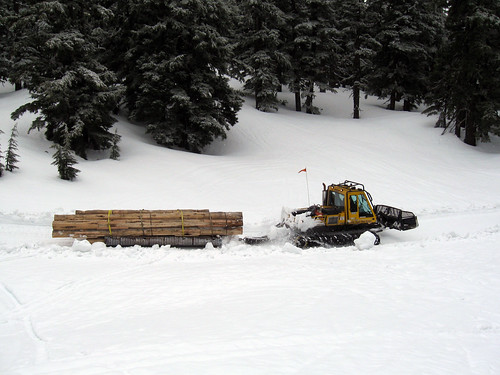
The Deschutes National Forest in Oregon and the Pike-San Isabel National Forests in Colorado were recently honored by the Coalition for Recreation Trails with the organization’s Achievement Award for trail projects that exemplify creative partnerships and leveraging funds.
The Deschutes project demolished the 25-year-old Kwohl Butte Shelter about 23 miles west of Bend, Ore., and rebuilt in a more fitting area 100 yards away. The Pike project corrected damage caused over the years by users who foraged their own trail to the summit of the 14,196-foot Mount Yale on the Collegiate Peaks Wilderness 10 miles west of Buena Vista, Colo.
U.S. Forest Service officials accepted the honors in Washington, D.C., during one of many events for the American Recreation Coalitions’ Great Outdoors Month.
In Oregon, the year-long project began with a $50,000 grant and tons of determination. After realizing airlifting heavy logs and equipment to the site proved too costly, the team of Forest Service employees and a host of volunteers used an old culvert and guard rails to devise a sled to carry the equipment pulled by a snowcat.

“This is the seventh shelter I’ve worked on with the forest, and we had some of the most creative ways to get this project completed that I’ve ever seen,” said Chris Sabo, trails supervisor on the Deschutes. “We have some pretty diehard, dedicated volunteers here in Central Oregon. One skier/mountain biker biked and hiked in there for a shelter he may never visit again, but he’s retired and enjoys helping out on projects – even at elevations of 6,700 feet.”
The Kwohl Butte Shelter, dwarfed by Mount Bachelor, will serve as a day-use respite for year-round recreationists. Volunteers logged more than 700 hours of time on the project.
In Colorado, two summers of back-breaking work above timberline on Mount Yale tested the limits of the Rocky Mountain Youth Corps, who spent 1,200 crew days over two summers on the project. They climbed 2,600 vertical feet by 5 a.m. each morning to reach the worksite, put in eight hours then headed back down the mountain to avoid Colorado’s mid-afternoon thunderstorms.
They focused on user-created trails on Mount Yale that followed the mountain’s fall line, leading to severe erosion and significant vegetation loss in a highly sensitive alpine environment. They rerouted 1.4 miles of trail, brought up to standard another 2.56 miles; heavily rebuilt a .29-mile section and stabilized and closed for use another 1.37 miles. They also planted or replanted more than 15,000 vegetative plugs.
“Logistically, it was tough,” said Ben Lara, recreation and lands program manager on the Salida Ranger District. “We were working in wilderness where only primitive tools can be used. It was all done by hand, including moving hundreds and hundreds of straw waddles and tons of rocks. Extremely hard work. But extremely rewarding.”

Youth Corps members were buoyed by hikers who came through the area.
“That really helped morale,” he said. “It became a great interaction on how the crew could impact recreationist and how recreationists really do cause an impact to the landscapes. For the Youth Corps, it was really tough work and the climbers showed they were appreciative of what the kids were doing.”
The Pike-San Isabel Nationals Forests received a Colorado State Trails Grant of $170,075, and that was leveraged by more than $400,000 in other federal, foundation, corporate and individual contributions.


